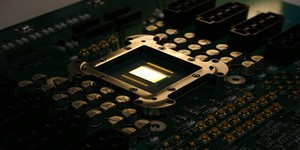
Intel has officially confirmed that it is bringing Hyper-Threading support back to its Pentium family in the Kaby Lake microarchitecture, but in doing so is sacrificing support for Error Correcting Code (ECC) memory.
Named in memory of Intel's original Pentium family, which launched in 1993 using the P5 microarchitecture as the first microprocessor Intel would launch using a non-numerical product name and the successor to the 80486, Intel's current Pentium range is designed to offer reasonable performance in budget builds. Sitting below the Core i3 family, the Pentium chips typically have smaller caches, lower clock speeds, fewer cores, and lack support for more advanced features. Among these is Hyper-Threading, Intel's technology for allowing a single physical core to run two threads simultaneously - effectively doubling the number of logical cores available to multi-threaded or multi-process software.
The last desktop Pentium chips to support Hyper-Threading were the microserver-centric Pentium D1508, D1517, and D1519, launched in 2015 using the Broadwell-DE microarchitecture. The switch to the Skylake microarchitecture later that year saw Hyper-Threading ditched from the majority of the Pentium range, bar the low-power Pentium 4405Y and Pentium 4405U, but with Kaby Lake Intel is bringing the technology back - confirmation, it would appear, that even budget desktops can begin to reap the benefits of having more than two logical processors cores to play with.
In technical details posted to the Intel Ark page, the company has confirmed that all currently announced Kaby Lake Pentium chips will include Hyper-Threading support, turning their two physical cores into four logical cores. This includes the company's lowest-power models, the Pentium 4410Y and 4415U, designed for embedded and ultra-portable systems.
The renewed support for Hyper-Threading comes at a cost, however: None of the currently listed Kaby Lake Pentium chips support Error Correcting Code (ECC) memory, commonly used in servers and workstations to reduce the risk of corruption or crashes due to unavoidable memory errors. While higher-power Skylake parts included ECC support, no Kaby Lake Pentium will include the same functionality - which, given the earlier Pentium models' popularity for low-power microservers, may come as a blow to some.
Named in memory of Intel's original Pentium family, which launched in 1993 using the P5 microarchitecture as the first microprocessor Intel would launch using a non-numerical product name and the successor to the 80486, Intel's current Pentium range is designed to offer reasonable performance in budget builds. Sitting below the Core i3 family, the Pentium chips typically have smaller caches, lower clock speeds, fewer cores, and lack support for more advanced features. Among these is Hyper-Threading, Intel's technology for allowing a single physical core to run two threads simultaneously - effectively doubling the number of logical cores available to multi-threaded or multi-process software.
The last desktop Pentium chips to support Hyper-Threading were the microserver-centric Pentium D1508, D1517, and D1519, launched in 2015 using the Broadwell-DE microarchitecture. The switch to the Skylake microarchitecture later that year saw Hyper-Threading ditched from the majority of the Pentium range, bar the low-power Pentium 4405Y and Pentium 4405U, but with Kaby Lake Intel is bringing the technology back - confirmation, it would appear, that even budget desktops can begin to reap the benefits of having more than two logical processors cores to play with.
In technical details posted to the Intel Ark page, the company has confirmed that all currently announced Kaby Lake Pentium chips will include Hyper-Threading support, turning their two physical cores into four logical cores. This includes the company's lowest-power models, the Pentium 4410Y and 4415U, designed for embedded and ultra-portable systems.
The renewed support for Hyper-Threading comes at a cost, however: None of the currently listed Kaby Lake Pentium chips support Error Correcting Code (ECC) memory, commonly used in servers and workstations to reduce the risk of corruption or crashes due to unavoidable memory errors. While higher-power Skylake parts included ECC support, no Kaby Lake Pentium will include the same functionality - which, given the earlier Pentium models' popularity for low-power microservers, may come as a blow to some.

MSI MPG Velox 100R Chassis Review
October 14 2021 | 15:04









Want to comment? Please log in.